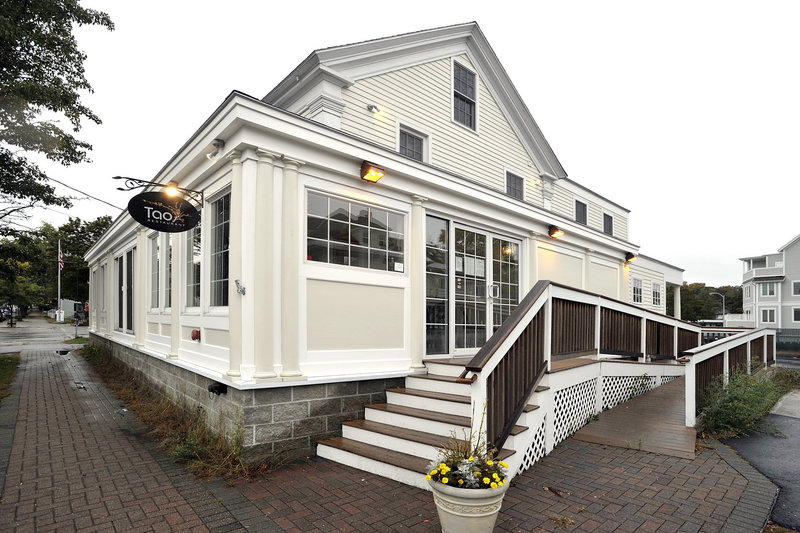Imagine steamed pork buns that rival those at an excellent dim sum spot in a large city but right here in Maine. Maybe those soft, sweet, meat-filled, edible pillows already dance in your head, like sugarplums.
That’s no illusion. That’s Grandma Tang’s roast pork buns ($6.80 for three), arriving hot and steamy in a bamboo basket at Tao in Brunswick. And the meat filling happens to be elevated to extra tenderness by 12 hours of sous vide preparation.
The pork bun is one of perhaps two dishes on Tao’s constantly changing menu that chef Cara Stadler doesn’t swap out. She is constantly modifying and enhancing her fare, seeking to fuse textures and flavors and Maine items when possible into harmonious small plates. She succeeds admirably.
Similar to the pork buns was the braised lamb tongue, but the latter meat is seasoned with the Middle East-influenced spices of the Uyghur people (of Xinjiang, a northwest region in China) and served in folded steamed pillows of dough. They were, in a word, fabulous ($9.60).
Tom yum soup was no afterthought, but a bowl of pure pleasure: Big chunks of Thai eggplant, chicken, potato and mushroom in a coconut milk-based broth poured ceremoniously over the ingredients at the table ($10.80, easily shared).
Tao also offers plenty of options from the sea. Maine diver scallops came with a caramelized golden crust atop a foamy Meyer lemon and white wine sabayon. Dashi-braised endive was the savory side with this delicate, slightly sweet and jewel-like dish ($13.80).
The kitchen gussied up modest salt cod by using it in a brandade ($9.80), which came as croquettes with pureed celeriac as part of the plush filling. Creme fraiche accompanied, the dish a nod to the chef’s time in France as a student at Le Cordon Bleu.
Long (very long) green beans sauteed with Sichuan pepper and minced pork (expect a little grease) made a crunchy and interesting side that four of us shared ($6.80).
Our December meal started off with a distinctive beet yuzu martini (yuzu is a Far Eastern citrus fruit), a dark-red stunner. The sour sugar rim gave way to soft beet flavor, hints of Thai basil and lemon, and lots of forward gin.
A portion of tender short rib ($14.80) in a brown sauce — served with baby bok choy and flat noodles as wide as lasagna — was a cold-weather winner made special with the addition of the almost-firm “tea egg,” its delicate white color tinged golden from steeping. The surprisingly effective grace note gave the dish a hint of herbal sweetness.
Tao’s many dishes in sequence — most are served one at a time — take you down new and intriguing roads. If you’re going to savor several, give yourself time at the table. It you want to go light, that works too. Perhaps have a bowl of tangy Asian slaw ($5.80; it easily serves two) and the soup or short rib, and you’ll be plenty satisfied. Because nothing here is ordinary, you can’t go wrong.
Something about our meal was clarifying. It was as if the chef had taken the best thinking about current cuisine — top-notch seasonal ingredients, new ethnic touches, garnishing details, tasting plates, an emphasis on local fare — and melded it into a new concept with an Asian flair. The result was sublime dishes that tasted as if they were already beloved classics.
Even the pineapple cake ($6.80) was a new riff on the old, again demonstrating how Tao makes an ordinary dish new and exciting. In this instance, a five-spice caramel sauce glazed the classic cake served warmed, with crispy edges and a rich cakey interior. Coconut gelato was the perfect topper.
Stadler, who opened Tao in June in partnership with her mother, Cecile, has an impressive culinary background working with renowned restaurateurs in Beijing, Shanghai and France.
Tao’s atmosphere is a stylish and attractive combination of contemporary decor with graceful Asian touches. The entry has comfortable low sofas, and the bar is set at a striking angle near the kitchen. On the holiday weekend we visited, our server said she wasn’t a regular, and there were a few details on the menu about which she wasn’t well versed. But other than that, service was gracious and careful from phone reservation to exit.
In a recent 2012 roundup article, New York Times restaurant reviewer Pete Wells wrote, “Arguing about whether cuisine can be art is fruitless, but without question great restaurants have the same power to reshape our perceptions.”
That’s Tao. I’ve felt that way on every visit, and I’ve been four times. With a few exceptions, each dish is like encountering a new miniature work of art.
I find it remarkable that this well-traveled, 25-year-old chef is turning out such uncommon food after just six months in business.
Nancy Heiser is a freelance writer and editor. She can be reached at:
nancyheiser.com
Send questions/comments to the editors.



Success. Please wait for the page to reload. If the page does not reload within 5 seconds, please refresh the page.
Enter your email and password to access comments.
Hi, to comment on stories you must . This profile is in addition to your subscription and website login.
Already have a commenting profile? .
Invalid username/password.
Please check your email to confirm and complete your registration.
Only subscribers are eligible to post comments. Please subscribe or login first for digital access. Here’s why.
Use the form below to reset your password. When you've submitted your account email, we will send an email with a reset code.